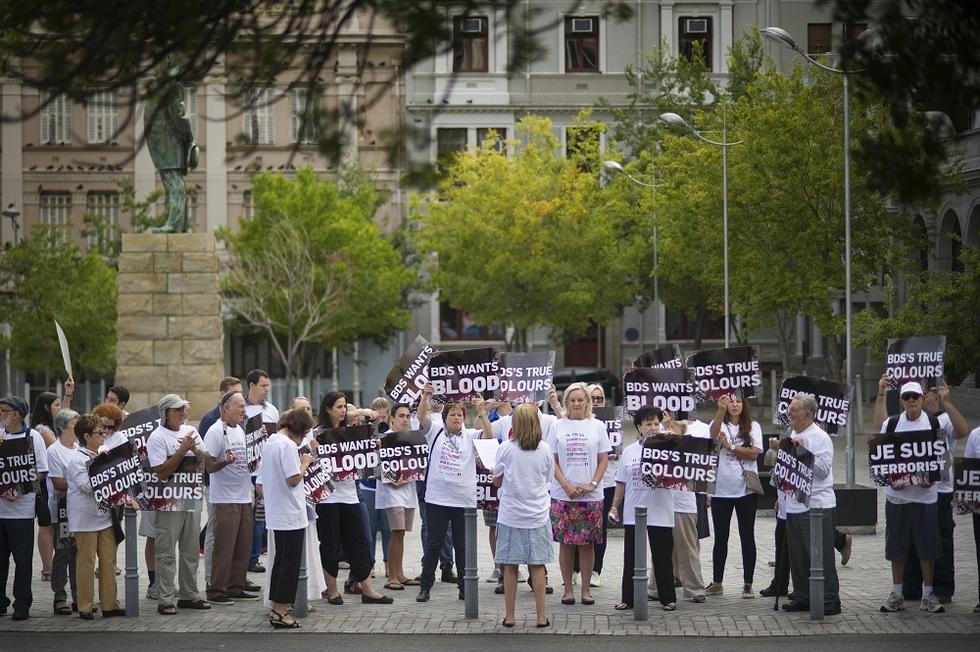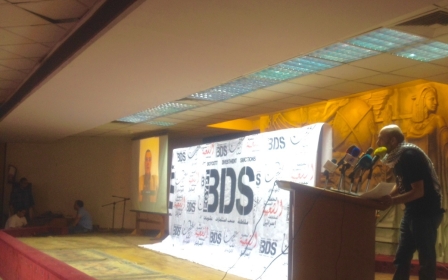BDS 10 years on, Israel eyes ‘strategic threat of the first order’

With the 10th anniversary of the Boycott, Divestment and Sanctions (BDS) movement coming up next month, the international drive to isolate Israel has been capturing world headlines and causing concern at the top echelons of Israeli society.
Earlier this month, there was an international stir about whether or not Stephane Richard, the CEO of French telecoms giant Orange, had become one of the world's most prominent businessmen to come out in support of BDS, although he quickly denied the allegations and said his comments had been taken wildly out of context. Shortly before that, BDS drew widespread attention when global soccer organisation FIFA were pressed to ban Israel.
The Palestinian football association withdrew its request to have Israel suspended from FIFA at the 11th hour, but BDS leaders remained firm in their insistence that more needed to be done.
The BDS movement started on 9 July, 2005, when 171 Palestinian civil society organisations banded together and decided to try a new approach to fight the occupation. Since then, the movement has expanded to include hundreds of campaigns on six continents.
They range from pushes for investors such as churches, trade unions and universities, to divest from companies holding Israeli military contracts, to consumer boycotts, calls for musicians and other artists to cancel appearances in Israel, and demands for governments to impose sanctions.
Each of these diverse efforts shares three common demands from Israel: end the occupation and colonisation of Arab lands and demolish its West Bank separation barrier; give full equality to its minority of Palestinian citizens; and allow the return of Palestinian refugees.
The goals, activists say, lend unity and cohesion to the diverse movement.
“Many - both opponents and proponents of justice - questioned the viability and the ‘practicality’ of the three demands,” said Riham Barghouti, a founding member of the Palestinian Campaign for the Academic and Cultural Boycott of Israel and co-founder of Adalah-NY: The New York Campaign for the Boycott of Israel.
“[But] the fact that we have had so many unions, churches, academic groups (students and faculty), community organisations, and even government agencies respond to the call shows the potential of this movement.”
The focus on demands also allows for innovation, said Maia Hallward, a professor of political science and international affairs at Kennesaw State University and author of Transnational Activism and the Israeli-Palestinian Conflict. “It is adaptable to different contexts and can be linked to other movements.”
A global framework also makes it particularly accessible. Unlike many of the world’s conflicts, which offer observers elsewhere few opportunities to act, the BDS movement affords supporters of Palestine a clear path.
“BDS was a tool for the international community to say that if you actually don’t like what is going on with the occupation, and don’t like what Israel is doing, here’s something you can do,” said Rabab Abdulhadi, an associate professor of ethnic studies at San Francisco State University and founding member of the US Campaign for the Academic and Cultural Boycott of Israel organising collective.
‘Tremendous boosters’
Over the past decade, Israel’s own actions have helped fueled the movement, with new activists and campaign successes following successive Israeli military operations.
“All of these crimes and massacres have served as tremendous boosters of the BDS campaign,” said Ofer Neiman, a member of the Israeli group Boycott! Supporting the Palestinian BDS Call from Within. “Many people all over the world have realised the nature of the regime in Israel.”
In particular, the unprecedented toll of last year’s offensive in Gaza spurred the movement in traditional bastions of support for Israel, such as the United States and the UK, he explained.
These efforts include drives for divestment by student bodies and university administrations, as well as academic boycotts of Israeli institutions.
The combination of these more local initiatives with larger drives, like the one to secure the suspension of Israel from FIFA, appear to have seriously rattled the Israeli leadership.
In a meeting with the Council of Presidents of Israeli Universities this month, Israeli President Reuven Rivlin called academic boycotts a “strategic threat of the first order”.
“I did not think there would be a genuine danger to Israeli academia, but the atmosphere in the world is changing, making it impossible not to see this issue as a strategic threat,” he said.
Council chair and Technion (Israel Institute of Technology) president Peretz Lavie told Rivlin that: “Anti-Israel student organisations were once very few; now they are at all the leading universities.”
Ruth Arnon, the president of the Israeli Academy of Sciences and Humanities, sounded similarly concerned.
“We cannot ignore the fact that BDS has garnered massive public relations toward the boycott,” she said.
Then, in a cabinet meeting last Sunday, Prime Minister Benjamin Netanyahu warned: “We are in the midst of a great struggle being waged against the state of Israel, an international campaign to its name.”
This rhetoric has been backed by action and Israel has been busy dedicating more time and energy to trying to squash BDS.
Israel has now pulled out all the stops to have Orange stay in the country. Netanyahu has invited the company’s CEO to visit the country, with Richard says that he is “radically opposed” to any trade boycott of Israel.
On 25 May, Netanyahu appointed Gilad Erdan as minister of public security, strategic affairs and public diplomacy, making him responsible for Israel’s response to both BDS activism and Iran’s nuclear programme.
Israel’s “national institutions” - ostensibly private but serving key roles in public administration - have also increased their activities.
The Jewish Agency, a predecessor of the State of Israel now responsible for coordinating Jewish immigration, announced on 19 May that it had responded to campus BDS campaigns by recruiting operatives at over 80 colleges and universities.
Last weekend, top pro-Israel funders, led by casino mogul Sheldon Adelson, hosted representatives of lobby groups at a private Las Vegas summit to “find best strategies” for countering Palestine supporters on campus. The gathering reportedly raised $20mn to support their own campus campaign, with a goal of raising $50mn.
Israel and its supporters also seek to hamper the movement through legislation and litigation.
In recent years, Israel has adopted a law subjecting BDS advocates to civil penalties, tried unsuccessfully to prosecute 12 activists in France, levied legal challenges against critical academics such as University of Sydney’s Jake Lynch, and even contemplated suing a US co-op for choosing to boycott Israeli products.
‘They often backfire’
Such heavy-handed measures, however, generally fail. And the latest gambit in the US - a raft of state legislation penalising the movement - seems no more likely to succeed.
Late last month, Abraham Foxman, director of the US-based Jewish non-governmental organisation, the Anti-Defamation League, warned fellow Israel supporters: “Legislation that bars BDS activity by private groups, whether corporations or universities, strikes at the heart of First Amendment-protected free speech, will be challenged in the courts, and is likely to be struck down.”
After threatening last month to prosecute BDS supporters under Canadian hate crime laws, the country’s Ministry of Public Safety appeared to pull back from that position under broad criticism.
The failures of these efforts, some activists say, illustrate one of the movement’s strengths.
“BDS is a grassroots movement,” S. El-Said, a member of the Swiss group BDS-Suisse, told MEE. “Israel cannot call a president of a country to stop it.”
Many facing measures to curb the BDS movment also expect them to have the opposite of their intended effects.
“Threats to repress BDS seem designed to intimidate activists and discourage those who might be inclined to participate in campaigns from doing so,” Sid Shniad, a member of the Independent Jewish Voices Canada national steering committee, said. “But as with all campaigns rooted in censorship and suppression of information, they often backfire.”
‘Focuses solely on Israeli occupation’
Yet BDS still faces a raft of serious internal challenges that could undermine the movement and its effectiveness as it continues to grow.
Having adapted to include a wide range of activities that include boycotts of products produced by Israeli settlements in the West Bank and divestments from arms merchants, some supporters have begun to worry that the broad appeal of certain aspects of the movement could be obscuring the depth of its vision.
These campaigns, most activists agree, are the easiest to organise and win, particularly in Western countries. But viewed outside the movement’s context, they can fail to convey its support for Palestinian refugees and those living inside Israel itself, a division that could fragment the movement.
“Despite the clarity of the demands, the largest part of the movement still focuses solely on Israeli occupation,” Barghouti said. “We need to figure out ways to more clearly delineate campaigns that promote all three of the demands of the movement.”
Adding to these concerns, some critics of the movement have voiced support for its campaigns focused on the occupation of the West Bank and the Gaza Strip, but not the return of refugees and better treatment of Palestinian citizens of Israel who are economically and socially excluded.
In 2012, 'Zionist BDS' proponent Peter Beinart defended a South African measure supported by BDS activists to require the labeling of settlement products. “By distinguishing between products from democratic and non-democratic Israel, South Africa is reinforcing the green line, and thus reinforcing Israel’s legitimacy inside its original boundaries,” he wrote. Those who oppose such separate labelling “are playing right into the one-statist BDS movement’s hands,” he added.
In March, political scientist Norman Finkelstein, a supporter of two states, rankled BDS activists by praising what he considered their willingness to compromise.
“They’ve had a real impact,” he told MEE. “But it’s been at the expense of their own platform,” he added, apparently referring to the movement’s three demands. “Every BDS victory has been at the cost of the platform.”
Critics of the movement often highlight its demand for the return of Palestinian refugees. Finkelstein warns that “if we end the occupation and bring back 6 million Palestinians and we have equal rights for Arabs and Jews, there’s no Israel.” Beinart echoed these criticisms, adding that its demand to end the occupation of Syria’s Golan Heights was “nuts”. Meanwhile, some Palestinians wonder if the BDS campaign reaches far enough.
Writer and photographer Yazan Khalili wrote last year that BDS’s immediate agenda “allows the apparatus that created the atrocities to survive and continue existing. In a way, it is like giving people freedom in South Africa but keeping the apartheid system in place”. As the movement gets ready to mark its 10th birthday, such debates are only set to continue.
New MEE newsletter: Jerusalem Dispatch
Sign up to get the latest insights and analysis on Israel-Palestine, alongside Turkey Unpacked and other MEE newsletters
Middle East Eye delivers independent and unrivalled coverage and analysis of the Middle East, North Africa and beyond. To learn more about republishing this content and the associated fees, please fill out this form. More about MEE can be found here.




